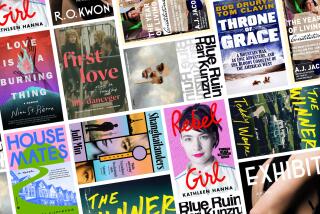‘The Good Soldiers’ follows an Army battalion in Iraq
The Good Soldiers
David Finkel
Farrar, Straus and Giroux: 284 pp., $26
U.S. Army Lt. Col. Ralph Kauzlarich’s favorite saying is “It’s all good.” In April 2007, he led a battalion of 800 soldiers into one of the most dangerous areas in Baghdad. The 2-16 Battalion left Fort Riley, Kan., to stay in Iraq for 15 months. The average age of the soldiers was 19. David Finkel, a reporter for the Washington Post, does a stunning job of bringing us inside their lives, hearts and minds. He notices what they hold for good luck, how they stand to keep from getting hit, what parts of their bodies they tend to protect. He takes us into the terribly dangerous Humvees, moving coffins, as they move across the Iraqi landscape; they are hit again and again, dragged in, cleaned up and sent out again. He goes home with the men on leave and shows how several are forever changed. They have seen their fellow soldiers burn to death, explode, return home missing limbs, eyes, feet, hands. By July 2007, he writes, many of the men looked frantic and exhausted, even as they tried to keep their spirits up. “The thing is,” Kauzlarich says, preparing to call a newly widowed woman, “they can’t kill all of us.” Finkel has given us an indelible insight into this war. Back in Col. Kauzlarich’s house in Kansas, a stuffed animal equipped with a motion sensor yells “I seeeee you” when his children enter the kitchen. It is meant to remind them of their father when he is at war. It is one of many details that give this book its resounding echo.
After America’s
Midlife Crisis
Michael Gecan
Boston Review/MIT Press: 144 pp., $14.95
Michael Gecan has been a community organizer in Chicago for 30 years. In this practical little book, he offers observations and suggestions for pulling America’s cities and suburbs back from the brink of decrepitude and dysfunction. While he admires liberal politicians, he writes that their alignment with elite universities and institutions often stymies success. “Both temples,” he writes of the extremes, liberal government solutions and the free market, “are in ruins.” Gecan reminds his readers that community relationship-building is “a craft that depends on high standards, some recognized masters, a process of apprenticeship, and a commitment to ongoing evaluation and improvement.” He writes about the importance of rewarding community workers (police, teachers); and about the “culture of insecurity” in communities -- the efforts spent keeping people out with walls and private security. Gecan was 9 when a fire leveled his overcrowded elementary school in Chicago in 1958, killing 92 children and three women. His ideas about community were forged in that fire.
Field Notes on Democracy
Listening to Grasshoppers
Arundhati Roy
Haymarket Books: 230 pp., $20
Arundhati Roy is the conscience of her country. She has used her international fame as a novelist (“The God of Small Things”) to speak and write about justice and political vision in India and around the world. This collection of essays goes back to 1989, when India aligned itself wholeheartedly with the United States to embrace nationalism and development, “those unimpeachable twin towers of modern, free-market democracy. Both of these in their extreme form, are, as we now know, encrypted with the potential of bringing about ultimate, apocalyptic destruction (nuclear war, climate change).” Roy has written movingly for decades about the displacement of Indians in the name of progress -- 30 million taken from their homes so the government could build dams. She writes about the war in Kashmir (“How can a government that claims to be a democracy justify military occupation?”) and about the economic and political changes in what she calls “counterfeit” India: the squeaky clean Bollywood. “Can we not find it in ourselves to belong to an ancient civilization,” she writes, “instead of to just a recent nation? To love a land instead of just patrolling a territory?”
“What have we done to democracy? What have we turned it into?”
More to Read
The biggest entertainment stories
Get our big stories about Hollywood, film, television, music, arts, culture and more right in your inbox as soon as they publish.
You may occasionally receive promotional content from the Los Angeles Times.










